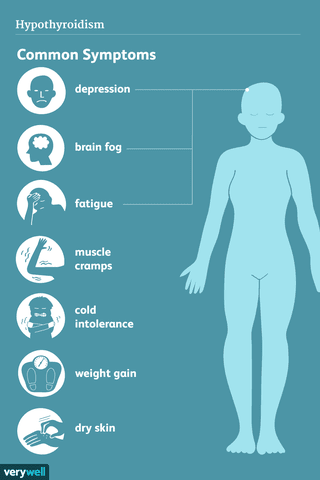Thyroid Disease Symptoms
Symptoms differ between hypothyroidism and hyperthyroidism
Medically reviewed by Do-Eun Lee, MD
Thyroid disease symptoms include fatigue, unexplained weight changes, a racing heart, and other signs that are related to a thyroid disorder. They are signs that the thyroid, a gland found near the base of your neck, is affected—and the thyroid, in turn, affects other body systems.
However, hyperthyroidism (overactive thyroid) and hypothyroidism (underactive thyroid) often have opposite effects. There also are thyroid disease symptoms, such as unusual skin rashes that look like hives, that may be specific to an immune system disorder like Graves' disease.
This article takes a look at the symptoms of various thyroid problems. It also describes some serious conditions that can arise if symptoms are left untreated, and why it's important to see your healthcare provider.

Verywell / Emily Roberts
What Is the Thyroid?
The thyroid is a small, butterfly-shaped gland located at the front of the neck, just below the voice box. It secretes four hormones:
Thyroxine
Triiodothyronine
Reverse triiodothyronine (RT3)
Calcitonin
The first three regulate metabolism, or how your body stores and uses energy, while calcitonin helps regulate the amount of calcium in the blood. Together, these hormones control many of the body's important functions, such as breathing, heart rate, digestion, and temperature.
Takeaway
With hypothyroidism, it more often affects people age 60 and older. It's also more common in biological females. Hyperthyroidism affects females more often too, but occurs in earlier decades of adulthood. Keep in mind that even children can have a thyroid disorder.
Overactive Thyroid Symptoms (Hyperthyroidism)
Hyperthyroidism occurs when your thyroid produces more hormones than your body needs. Symptoms of this disorder include:
Nervousness or irritability
Fatigue and difficulty sleeping
Muscle weakness
Trouble tolerating heat
Tremor, usually in your hands
Rapid and irregular heartbeat
Frequent bowel movements or diarrhea
Weight loss
Underactive Thyroid Symptoms (Hypothyroidism)
Hypothyroidism is the opposite of hyperthyroidism: It occurs when your thyroid doesn't produce enough hormones. Some of the symptoms are:
Fatigue
Weight gain
Puffy face
Always feeling cold
Joint and muscle pain
Constripation
Dry skin or hair
Depression
Decreased sweating
Brain fog
Other Thyroid Symptoms
In addition to common symptoms, there are some rarer signs that could point to hyperthyroidism or hypothyroidism:
Low cholesterol: Your cholesterol may stay too low despite your diet, weight, and exercise, signaling hyperthyroidism. With hypothyroidism, your cholesterol level may stay high even after you change your diet, exercise, or take medications such as statins.
Rashes: Hyperthyroidism and Graves' disease can cause pretibial myxedema. It's also known as thyroid dermopathy. The skin on your shins may swell and turn red. In some cases, a bumpy rash known as miliaria can also appear on the face.
Bulging eyes: Some people with Graves' disease have something called Graves' opthalmopathy, which is when inflammation affects muscles and tissues around the eye. The most notable symptom is bulging eyes. Your eyes may not be completely covered when your eyelids close.
Myxedema: With hypothyroidism, a substance called hyaluronic acid can build up in the lower layer of the skin. The result is coarse hair and skin, puffiness, tongue enlargement, and hoarseness.
When to See a Healthcare Provider
If you have thyroid symptoms, visit your healthcare provider. Certain thyroid symptoms call for emergency medical care.
Thyroid storm is a rare but very serious condition. It occurs when hyperthyroidism isn't treated. Stressful events like surgery, trauma, or infection can trigger it.
In a thyroid storm, symptoms ramp up to dangerous, even deadly, levels. You may have:
A very fast heart rate
High fever
Diarrhea
Agitation
Delirium
Loss of consciousness
Hypothyroidism can lead to another medical emergency. It's called myxedema coma.
Myxedema coma is rare. It's triggered by trauma, infection, cold, and some medications. It causes body temperatures and blood pressure to drop. You may lose consciousness. This condition can cause death.
Diagnosis
To find out what's going on with your thyroid, a healthcare provider may:
Give you a physical exam
Ask questions about your medical history
Ask for details about your symptoms
Give you a blood test to check your thyroid levels
Order imaging tests, such as a thyroid scan or ultrasound
Takeaway
You can perform a thyroid "neck check" at home. Look for lumps on the thyroid gland. A swollen thyroid gland could indicate various thyroid conditions, including nodules, goiters, or thyroid cancer.
Treatment
Treatment will depend on whether you have an underactive or overactive thyroid.
For an overactive thyroid, treatment options include:
Antithyroid medications, which help your thyroid to produce less thyroid hormone
Beta blockers, which can help reduce symptoms such as tremors and rapid heartbeat
Radioiodine therapy, a medication that destroys the cells of the thyroid gland that produce hormones
Surgery, in rare cases
Hypothyroidism is typically treated by hormone replacement therapy. The most common medicine is levothyroxine, which most people take as a pill but it can also be given intravenously for people with severe hypothyroidism. Doctors will typically prescribe the lowest dose possible that will bring your hormone levels back to normal.
Takeaway
There is no specific diet for hyperthyroidism. Still, some foods can affect your thyroid medications. Limit your iodine intake, and be mindful of soy, selenium, and cruciferous vegetables.
Summary
Your thyroid produces hormones that affect many different organs and functions in your body. The symptoms differ depending on whether your thyroid is overactive or underactive. People with an overactive thyroid may feel nervous, have a rapid heartbeat, be fatigued, and have muscle weakness. An underactive thyroid can cause symptoms such as constipation, fatigue, feeling cold, paleness, or joint or muscle pain.
It's best to contact a healthcare provider if you have symptoms of hyperthyroidism or hypothyroidism. With medication, symptoms can improve.
Related: What Is Graves' Disease?
Related: Fertility and Pregnancy Challenges With Thyroid Disease
